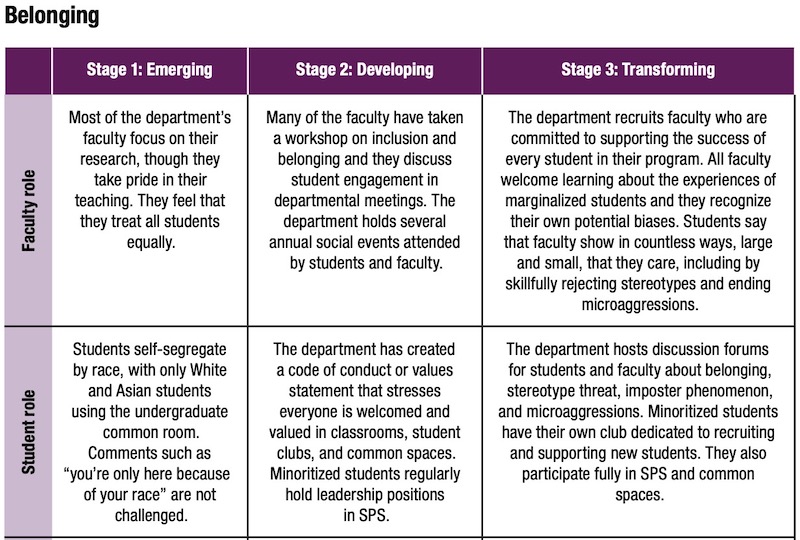Developed by The TEAM-UP Task Force
| Purpose | To enable physics and astronomy departments to evaluate departmental effectiveness at educating African American students. |
|---|---|
| Format | Rubric |
| Duration | N/A min |
| Focus | Department Climate (Assessment practices, departmental practices, advising practices, student recruitment, equity and inclusion, student identity, student belonging, financial supports) |
| Level | Upper-level, Intermediate, Intro college |
Sample rubric items from the TEAM-UP Rubric:

The TEAM-UP recommendations provide explanation for the 5 factors on the rubric, and how a department might achieve them.
more details
This is the lowest level of research validation, corresponding to at least one of the validation categories below.
Research Validation Summary
Based on Research Into:
- Relevant theory and/or data
Studied Using:
- Iterative use of rubric
- Inter-rater reliability
- Expert review
Research Conducted:
- At multiple institutions
- By multiple research groups
- Peer-reviewed publication
The five factors in this rubric, and markers of success in each factor, were developed based on a broad data set: National surveys of undergraduate physics majors, departmental surveys, interviews with African American students, and site visits to departments that excel in graduating African American students. It was also modeled on other rubrics: (1) the 2017 New England Resource Center for Higher Education Self-Assessment Rubric for the Institutionalization of Diversity, Equity, and Inclusion in Higher Education and (2) the 2018 AAS Task Force on Diversity and Inclusion in Astronomy Graduate Education Departmental Self-Assessment Rubric. Other than this grounding in empirical and theoretical understanding of departmental climate, it has not been research-validated to determine the degree to which rubric results do or do not correspond to a strong departmental climate.
References
- E. Bertschinger, Systemic Change: TEAM-UP and Beyond, presented at the Physics Education Research Conference 2020, Virtual Conference, 2020.
We don't have any translations of this assessment yet.
If you know of a translation that we don't have yet, or if you would like to translate this assessment, please contact us!
| Typical Results |
|---|
There are no typical scores available for the TEAM-UP Rubric, as it is meant to be used for self-study to show you the strengths and weaknesses of your program. |
The latest version of the TEAM-UP rubric, version 1, was released in 2020. This rubric is modeled after the 2017 New England Resource Center for Higher Education Self-Assessment Rubric for the Institutionalization of Diversity, Equity, and Inclusion in Higher Education and the 2018 AAS Task Force on Diversity and Inclusion in Astronomy Graduate Education Departmental Self-Assessment Rubric.



